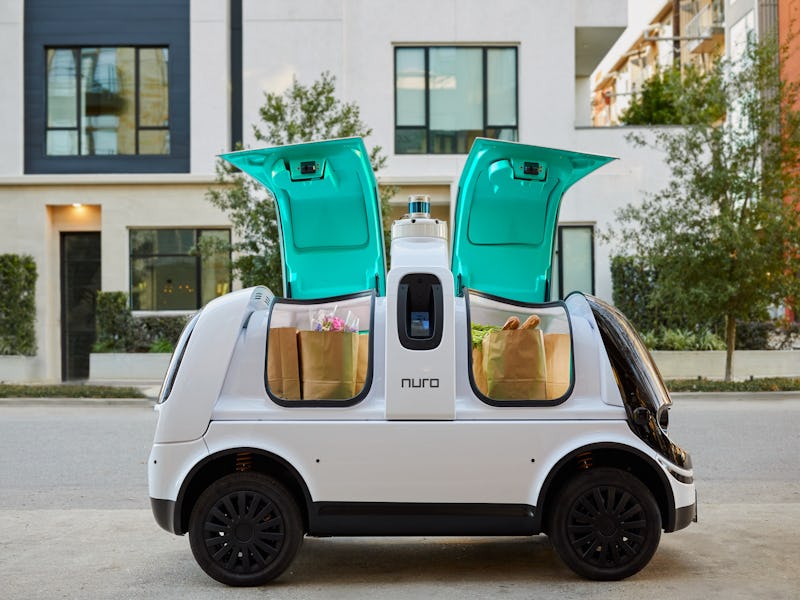Nuro's driverless delivery vehicle is coming to Houston
Nuro has received an exemption from the National Highway Traffic Safety Administration to deploy up to 5,000 vehicles.

You may soon be getting your groceries delivered to you by a car with no driver. The National Highway Traffic Safety Administration (NHTSA) just approved an exemption for the autonomous vehicle startup Nuro to deploy 5,000 driverless electric delivery vehicles.
The company had to get an exemption because existing safety regulations that automakers have to abide by require vehicles to have things like mirrors and a steering wheel—pretty useful things in most cars—because they were written with vehicles that are operated by humans in mind. The NHTSA decided on Thursday, for the first time, that a company can move forward with deploying these types of vehicles despite these regulations.
The exemption is for Nuro's R2 delivery vehicle, which is the company's second-generation self-driving vehicle. It is designed only to carry packages, so there won't be any passengers inside. Nuro wrote in a blog post that the company is excited about this development.
"We custom-designed R2 to enrich local commerce with last-mile delivery of consumer products, groceries, and hot food from local stores and restaurants," the Mountain View, California-based company wrote. "With its specially designed size, weight, pedestrian-protecting front end, operating speed, electric propulsion, and cautious driving habits, R2 is ready to begin service as a socially responsible neighborhood vehicle that you can trust."
Nuro will start testing out deliveries on public roads in Houston, Texas within a few weeks. One of the reasons the R2 was approved is that it's a "low-speed neighborhood vehicle," so it wasn't seen as a danger. The vehicle is also pretty small, with about half the width of a normal car, so it's not too intimidating. It will be monitored by a remote operator at all times in case they need to take control at any point.
This isn't Nuro's first time testing out autonomous deliveries. The company began testing out deliveries with its R1 vehicle in Scottsdale, Arizona at the end of 2018, and there weren't any incidents. The company delivered groceries for Kroger and a local grocer for a $5.95 fee. Groceries were put in the vehicle by an employee and delivered to where they were going by an R1. Nuro has ended that test and is looking to Houston.
The R2 is a significant update, as it is more durable to handle harsh driving conditions, the sensors have been upgraded and the battery size has been almost doubled.
Nuro didn't name the companies it will be doing deliveries for in Houston in the blog post, but it says it has "multiple partners." We know one of the companies will be Walmart, as the retail chain announced in December it would be partnering with Nuro to do deliveries in Houston. There are over 30 Walmarts in Houston, so who knows if the company will be delivering for all of them.
Tom Ward, senior vice president of digital operations for Walmart U.S., said at the time that this is the future of grocery delivery.
“We’ve been test-driving a number of different options for getting groceries from our stores to our customers’ front doors through self-driving technology. We believe this technology is a natural extension of our Grocery Pickup and Delivery service and our goal of making every day a little easier for customers,” Ward said. “By continuing to test autonomous vehicle capabilities, we’re better able to understand the path self-driving technology can take us down the road.”
Though these little vehicles are really cool and seem to be pretty safe, this development could mean fewer people will be working as grocery delivery drivers. I know I'd rather get a delivery from a robot when I walk out of my house looking like I was just breakdancing in a tornado, but there are negative consequences to automating these kinds of things.